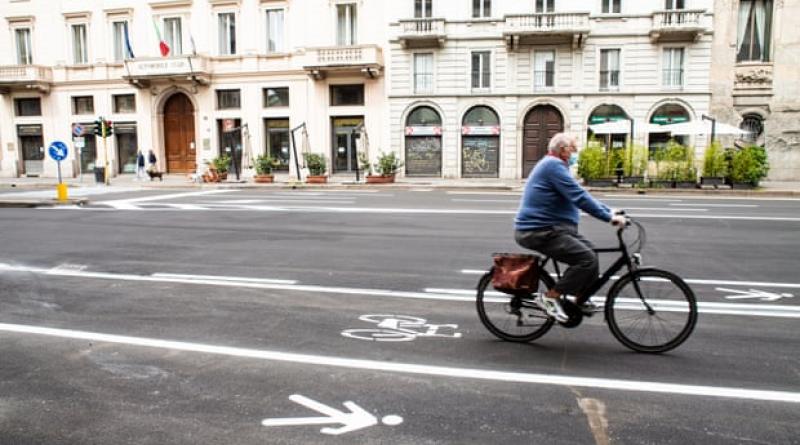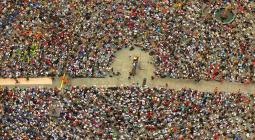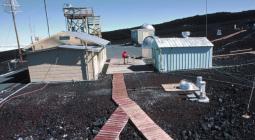City leaders aim to shape green recovery from coronavirus crisis.

Mayors coordinating efforts to support a low-carbon, sustainable path out of lockdowns
ities around the world are already planning for life after Covid-19, with a series of environmental initiatives being rolled out from Bogotá to Barcelona to ensure public safety and bolster the fight against climate breakdown.
Mayors from cities in Europe, the US and Africa held talks this week to coordinate their efforts to support a low-carbon, sustainable recovery from the crisis as national governments begin to implement huge economic stimulus packages.
Many cities have already announced measures, from hundreds of miles of new bike lanes in Milan and Mexico City to widening pavements and pedestrianising neighbourhoods in New York and Seattle.
The initiatives are designed to allow people to move around urban spaces safely in a world where physical distancing will be the norm for the foreseeable future – and do so without sparking a drastic increase in air pollution.
The mayors who took part in the newly formed economic taskforce this week believe these initial schemes point the way to more radical long-term measures that will help tackle inequality and the climate crisis.
The mayor of Milan, who is heading the taskforce run by the C40 group of cities, said: “Our immediate priority is to protect the health of our residents and overcome the Covid-19 pandemic. However, we must also look towards how we will keep our people safe in the future. How we structure our recovery efforts will define our cities for decades to come.”
The mayors discussed measures ranging from huge retrofitting programmes to make buildings more energy efficient, to mass tree planting and investment in solar and wind power.
The mayor of Montréal, Valérie Plante, who attended the video meeting, said: “We need more than ever to position our economic recovery in the context of our fight against climate change. It is also clear to me that our economic recovery must go hand in hand with our social recovery.”
Milan has introduced one of Europe’s most ambitious cycling and walking schemes, with 22 miles of streets to be transformed over the summer.
In Paris, the mayor has allocated €300m for a network of cycle lanes, many of which will follow existing metro lines, to offer an alternative to public transport.
In Bogotá, the Colombian capital, a 75-mile network of streets usually turned over to bicycles one day a week will now be traffic-free all week, and a further 47 miles of bike lanes are being opened to reduce crowding on public transport and improve air quality.
New York has unveiled plans to open up 100 miles of streets for “socially responsible recreation” during the Covid-19 crisis, with a focus on areas with the most need, while Oakland, in California, is closing off 75 miles of its streets to passing cars and setting aside up to 10% of streets for recreation.
Mexico City is planning 80 miles of temporary bike lanes, and Barcelona is adding 30,000 square metres to its pedestrianised networks and 13 miles to the biking network.
In the UK, the Scottish government has announced £10m to create pop-up walking and cycling routes, while mayors in northern England have suggested a national programme to retrofit homes with renewable energy technology. On Thursday Manchester city council announced it would pedestrianise part of Deansgate, in the city centre. In London, boroughs including Lambeth and Hackney have announced measures to widen pavements, close roads to traffic and improve walking and cycling.
Dr Rachel Aldred, at the University of Westminster, said the action city leaders take in the next few weeks would be critically important. “This is a really important moment. There is the potential to lock in the reduction in air pollution we have seen over the past weeks if we get this right, but as people begin to go back to work and can’t or don’t feel safe using public transport, there is the potential to instead lock in a huge increase in car use and pollution.”
Mark Watts, the chief executive of C40, said mayors had a lot of power to protect their citizens and shape the direction of the recovery. “There is now a hell of a lot of collaboration among very powerful politicians who do think a green economic recovery is absolutely essential,” he said.
“We are talking about collectively creating funds that they all put money into which would then support electric vehicles, support rollout of cycle lanes, support retrofitting of buildings … C40 cities using the hundreds of millions of dollars in their pension funds for this and getting very good long-term returns.”
Watts said although many of these initial measures had been billed as short term, he expected them to endure. “This is how cities are going to function for the next two years, and probably that will transition – if we have a green economic recovery – into permanence.”
Daisy Narayanan, the director of urbanism at Sustrans, agreed that the recovery from the Covid-19 crisis could be “a catalyst for long-lasting change in the way we live and travel, especially in towns and cities. What Covid-19 has also done is to highlight the crossovers between the quality of our places, public health, economy, transport, education, air quality and social justice.”
In recent weeks scientists have tentatively linked air pollution to Covid-19 mortality rates and even the spread of the virus. Narayanan added: “Action needs to be taken now which will help people move around without the congestion, pollution and ill-health that comes with car use now and after lockdown is lifted.”
Seven things city leaders can do to drive a green, fair recovery from Covid-19
-
Remove through motor traffic from residential streets and extend pavements near shops, schools and parks to make walking safe and enjoyable for transport and exercise.
-
Introduce safe access routes on foot, bike and scooter from homes to parks and green spaces and introduce automatic pedestrian lights at crossings so people do not have to push buttons and risk infection.
-
Establish safe cycle routes to and from work for key workers, especially hospital staff, by closing roads and carriageways where necessary so people have a safe alternative to private cars and public transport.
-
Create safe walking and cycling routes to and from schools, and close down streets around schools to motor vehicles at drop-off and pickup times.
-
Use libraries, schools and sports stadiums to distribute nutritious, sustainably produced food to communities that need it most, and scale up food waste collection and treatment, including distributing household composting kits and guidance.
-
Retrofit all public buildings, many of which are empty now, drastically improving energy efficiency and creating thousands of green jobs.
-
Work with other cities to invest the billions tied up in city funds and pensions in climate solutions to drive green job creation and create a more resilient and sustainable economy.
1 May 2020
The Guardian




